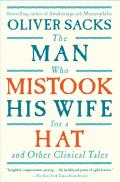
- Publisher: SIMON & SCHUSTER TRADE
- Publication date: 04/02/1998
- Pages: 256
- Copyright Year: 1985
- ISBN: 0-684-85394-9
- Author: Oliver Sacks
The Man Who Mistook His Wife For a Hat and Other Clinical Tales by Oliver Sacks is the updated version of the book originally published in 1970 about various strange cases of neurological issues from a wide variety of people. The case studies are fascinating in the descriptions of people and the conditions they experience, from the title character who grabbed his wife’s head thinking it was a hat, to the man who lost several years of memory from alcohol addiction and the lost the ability to make new memories, to the savants who perform amazing feats of mathematical calculations and memory; this book provides insights into the human brain that are surprising and engaging.
The original version of the book is over 50 years old, and even with the updates for the 1985 edition, it is almost 40 years old. The stories are still very interesting, but I am sure some of the language, the diagnoses, etc. are outdated. He uses the language that may have been appropriate for the time, but would probably be considered dated and even offensive today. Such terms as ‘idiot savant’ and ‘retarded’ would not be considered appropriate today. These terms are not used with any malice; they are just the accepted semantics of the time. I am sure some of the diagnoses and the described symptoms and causes might be better handled today than they were by Sacks, but that is nothing against the author, but only because science and society has progressed.
The book is organized into four parts:
- Losses – describing conditions where people lost abilities they previously had due to injuries, sickness, alcoholism, etc.
- Excesses – describing new abilities or sensations that were added above and beyond normal, with similar causes to the losses.
- Transports – describing altered perceptions, imaginations and waking dream states
- The World of the Simple – describing people who due to genetics or injuries were considered ‘simple’. This is the section that had the most objectionable language and, while the cases are still interesting, they deserve more enabling language.
If you are interested in the human brain and its foibles, idiosyncrasies, abilities and disabilities, this is a good book to read. I got my copy from a used book sale so there may be more up-to-date editions with more up-to-date verbiage, but even if it is not updated, there is a lot of fascinating information.
________________________
And if you like fiction about different types of people, check out my book.
Plastiphobia – aka Plastivore by Matt Truxaw

Matt Truxaw’s newest book is Monster, which released on 1/12/2026. This urban fantasy, horror, thriller will keep you turning the pages.
He is also the author of the hard science fiction thrillers: “Plastiphobia/Plastivore” and “Anthrophobia: A Teacher’s Tale”
You can find them all on Amazon in Paperback, Hardback, Kindle and/or free to read with Kindle Unlimited.
When you read any of them, he would really appreciate a review/rating on Amazon or your favorite book seller/book reader site.
More about Matt:
He was born in Orange County California many years ago and he still lives there. He has been reading books for most of those years and writing up book reviews for the last few years. He gets MANY of his books out of the library/Libby so expect a lot of old science fiction classics book reviews and other science related reviews in addition to newer books he comes across.
If you want to be ‘in-the-loop’ on these and other works, you can follow his author’s page on Amazon or his Facebook page.
For more reviews and articles by Matt here on Amazing Stories (Click here).
Monster: A Novel by Matt Truxaw












